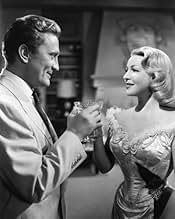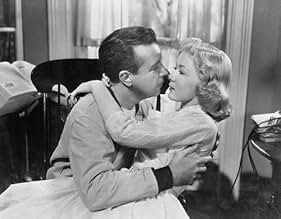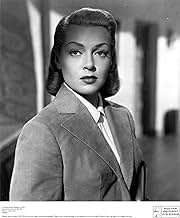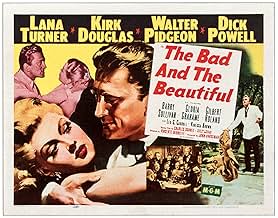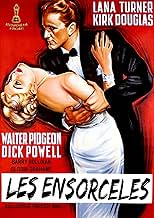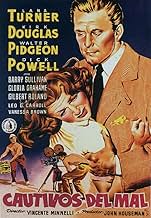CALIFICACIÓN DE IMDb
7.7/10
17 k
TU CALIFICACIÓN
Un productor de películas sin escrúpulos utiliza a una actriz, un director y un escritor para alcanzar el éxito.Un productor de películas sin escrúpulos utiliza a una actriz, un director y un escritor para alcanzar el éxito.Un productor de películas sin escrúpulos utiliza a una actriz, un director y un escritor para alcanzar el éxito.
- Dirección
- Guionistas
- Elenco
- Ganó 5 premios Óscar
- 7 premios ganados y 7 nominaciones en total
Jay Adler
- Mr. Z - Party Guest
- (sin créditos)
Stanley Andrews
- Sheriff
- (sin créditos)
Del Armstrong
- Georgia's Makeup Artist - Screen Test Scene
- (sin créditos)
Ben Astar
- Joe - Party Guest
- (sin créditos)
Barbara Billingsley
- Evelyn Lucien - Costumer
- (sin créditos)
- Dirección
- Guionistas
- Todo el elenco y el equipo
- Producción, taquilla y más en IMDbPro
Opiniones destacadas
"The Bad and the Beautiful" takes a look at Hollywood. This incisive take about how movies are made, directed by Vincente Minnelli, dares to go behind the scenes to show what goes on in the way the film industry operates. The film adaptation by Charles Schnee gives us a good idea of that unreal world of fantasy and hype.
At the center of the story is Jonathan Shields, a young man with connections to the industry. He wants to follow his father's footsteps and goes at it vigorously, making friends and enemies along the way. Jonathan discovers he can be ruthless whenever he wants. His first victim is Fred Amiel, the talented director who Jonathan bypasses in favor of a more established one. Jonathan quickly forgets the friendship Fred and his wife showed him before becoming a big producer.
Then there is there is Georgia Larrion, the boozy daughter of a famous actor. Jonathan shows how he wants Georgia to succeed in the business, personally taking care of selling her to star in his big project, only to betray her with another woman, a glamorous bit player. When Georgia discovers the truth, she flees Jonathan's mansion in a clear night that suddenly turns into a torrential downpour and loses control of the car, but she doesn't suffer a scratch!
The last victim of Mr. Shields is the Pulitzer prize winner, James Lee Bartlow, who Jonathan coaxes into leaving his academic life to adapt his own novel for the movies. James is married to the flighty Rosemary, in whom Jonathan discovers a weak link that will do anything to hobnob with the celebrities. Jonathan makes it easy for Rosemary to fall into an affair with the star of Shields' film.
When we first watched this film, it seemed much better, than on this viewing where a lot of things surface to make some of the story much weaker than before. Some viewers have compared this film with the fate of Orson Welles in Hollywood, and there are a couple of references that could be interpreted that way. Whether it was so, or not, it's up to the viewer to guess where the truth lies.
Kirk Douglas gave a strong performance as Jonathan Shields. Mr. Douglas showed he clearly understood who this man was. He runs away with the film, in our humble opinion. Lana Turner, a beautiful presence in any movie, is good, but at times she appears to be overwhelmed by the range of emotions she has to project, especially with that phony car scene.
Dick Powell and Gloria Graham put in an excellent appearance as the Bartlows. Barry Sullivan disappears after Lana shows up, not to be seen until the end. Walter Pigeon is effective as the studio head. Gilbert Roland is perfect as Gaucho, the Latin actor with a lot of charisma.
Mr. Minnelli shows he wasn't afraid to portray the industry the way we see it in the film, not a small accomplishment, knowing well how it could have backfired on him. Hollywood is not forgiving to those who dare to show its ugly side and that's when the parallel with Orson Welles problems with the system and eventual exile can be drawn.
At the center of the story is Jonathan Shields, a young man with connections to the industry. He wants to follow his father's footsteps and goes at it vigorously, making friends and enemies along the way. Jonathan discovers he can be ruthless whenever he wants. His first victim is Fred Amiel, the talented director who Jonathan bypasses in favor of a more established one. Jonathan quickly forgets the friendship Fred and his wife showed him before becoming a big producer.
Then there is there is Georgia Larrion, the boozy daughter of a famous actor. Jonathan shows how he wants Georgia to succeed in the business, personally taking care of selling her to star in his big project, only to betray her with another woman, a glamorous bit player. When Georgia discovers the truth, she flees Jonathan's mansion in a clear night that suddenly turns into a torrential downpour and loses control of the car, but she doesn't suffer a scratch!
The last victim of Mr. Shields is the Pulitzer prize winner, James Lee Bartlow, who Jonathan coaxes into leaving his academic life to adapt his own novel for the movies. James is married to the flighty Rosemary, in whom Jonathan discovers a weak link that will do anything to hobnob with the celebrities. Jonathan makes it easy for Rosemary to fall into an affair with the star of Shields' film.
When we first watched this film, it seemed much better, than on this viewing where a lot of things surface to make some of the story much weaker than before. Some viewers have compared this film with the fate of Orson Welles in Hollywood, and there are a couple of references that could be interpreted that way. Whether it was so, or not, it's up to the viewer to guess where the truth lies.
Kirk Douglas gave a strong performance as Jonathan Shields. Mr. Douglas showed he clearly understood who this man was. He runs away with the film, in our humble opinion. Lana Turner, a beautiful presence in any movie, is good, but at times she appears to be overwhelmed by the range of emotions she has to project, especially with that phony car scene.
Dick Powell and Gloria Graham put in an excellent appearance as the Bartlows. Barry Sullivan disappears after Lana shows up, not to be seen until the end. Walter Pigeon is effective as the studio head. Gilbert Roland is perfect as Gaucho, the Latin actor with a lot of charisma.
Mr. Minnelli shows he wasn't afraid to portray the industry the way we see it in the film, not a small accomplishment, knowing well how it could have backfired on him. Hollywood is not forgiving to those who dare to show its ugly side and that's when the parallel with Orson Welles problems with the system and eventual exile can be drawn.
A story of betrayals and misunderstandings in the festering underbelly of Hollywood; this is Vincente Minnelli's cool expose of the workings of a producer (Kirk Douglas, as one of the movies' great detestable characters) and the effect he has on those who come into contact with him: a director who feels abandoned yet goes on to produce his greatest work (Barry Sullivan); an actress who is rescued from semi-alcoholism and turned into a star (Lana Turner, in one of her trademark parts); and a prize-winning novelist who is uprooted to shape his book for the screen (Dick Powell, in one of his last film roles before moving into television and film directing).
We see their stories in a series of flashbacks, linked by the three enemies of Douglas coming together in the office of studio biggie Walter Pidgeon who coolly reminds them of the good things the producer brought to their lives along with the bad. There are other good performers in smaller roles Gloria Grahame as Powell's twittery wife, Gilbert Roland as the Latin temptation, and so on. The Bad and the Beautiful', filmed in good old black and white, has plenty of meat to keep you watching. Only the slightly twee ending lets it down, but you can't have everything.
We see their stories in a series of flashbacks, linked by the three enemies of Douglas coming together in the office of studio biggie Walter Pidgeon who coolly reminds them of the good things the producer brought to their lives along with the bad. There are other good performers in smaller roles Gloria Grahame as Powell's twittery wife, Gilbert Roland as the Latin temptation, and so on. The Bad and the Beautiful', filmed in good old black and white, has plenty of meat to keep you watching. Only the slightly twee ending lets it down, but you can't have everything.
Glossy MGM soaper has many things to recommend it, not the least of which is a surprisingly grounded, natural Lana Turner (looking great, even in ordinary jammies) playing a successful movie actress who, along with a top screenwriter and director, help producer-on-the-skids Kirk Douglas stage a comeback. Not especially revealing about Hollywood, which at this stage wasn't quite ready to unmask itself, but still engaging and intriguing. Douglas is well-cast (he spits out his lines with a terse jaw--nothing new--but he's right for this part and is commendable). Turner is a revelation and deserved at the very least an Oscar nomination for her work; the picture did go on to win Academy Awards in five categories, including Gloria Grahame as Best Supporting Actress; Charles Schnee, Best Screenplay; Robert Surtees, Best Cinematography, Black-and-White; Best Art Direction-Set Decoration, Black-and-White; and Best Costume Design, Black-and-White. Well-directed by Vincente Minnelli, the picture gets less attention than something like "All About Eve", but it's actually more entertaining. *** from ****
Part of what makes this film good is that Kirk Douglas's character is not shown as being completely evil - he manipulates people and can be ruthless about discarding them, but he's got real talent and is good for the career of everyone he comes in contact with. "Don't worry, some of the best movies are made by people working together who hate each other's guts," he says at one point, showing that (at least after he's established his own name) he cares most about making quality movies. I found authenticity in the nuances of this personality - he's ambitious, driven, knows how to get his way and the most out of other people, is self-aware, discerning, and artistic. Oh, and he's also kind of an asshole.
It's a film that starts slow and perhaps takes a little too long establishing his character, and the first story is a little less interesting than the two which follow. The film is told in flashbacks and explains how a director (Barry Sullivan), actor (Lana Turner), and a screenwriter (Dick Powell) don't want anything to do with him anymore after he runs afoul of each in different ways over his career. You see, he's calling them up now and hoping each will work on a new project of his, and none of them even want to talk to him.
The film really picks up with Turner; she turns in a strong performance and I loved the pathos of her story. She plays the alcoholic daughter of a great actor who doesn't have the same talent, and yet Douglas recognizes her star power. The scene where he starts questioning the shrine she has to her father and she attacks him was the point at which I thought the film may really have something. Powell is good too, and aided considerably by Gloria Grahame, who plays his wife and appears at about the 1:20 point and then lights up the screen for the moments she's on it, southern accent and all. What passion there is in the way she kisses Powell's character, and how she says "James Lee, you have a very naughty mind...I'm happy to say." The film's biggest moment belongs to Douglas however, when he explodes at Turner after she comes to his place following an opening night party - one that certainly must be among the best in his career.
Overall, it's an interesting look at Hollywood, and more generally, talent and ambition. I wasn't sure what would happen once the flashbacks were told and we returned to the present, and thought the ending was clever too.
It's a film that starts slow and perhaps takes a little too long establishing his character, and the first story is a little less interesting than the two which follow. The film is told in flashbacks and explains how a director (Barry Sullivan), actor (Lana Turner), and a screenwriter (Dick Powell) don't want anything to do with him anymore after he runs afoul of each in different ways over his career. You see, he's calling them up now and hoping each will work on a new project of his, and none of them even want to talk to him.
The film really picks up with Turner; she turns in a strong performance and I loved the pathos of her story. She plays the alcoholic daughter of a great actor who doesn't have the same talent, and yet Douglas recognizes her star power. The scene where he starts questioning the shrine she has to her father and she attacks him was the point at which I thought the film may really have something. Powell is good too, and aided considerably by Gloria Grahame, who plays his wife and appears at about the 1:20 point and then lights up the screen for the moments she's on it, southern accent and all. What passion there is in the way she kisses Powell's character, and how she says "James Lee, you have a very naughty mind...I'm happy to say." The film's biggest moment belongs to Douglas however, when he explodes at Turner after she comes to his place following an opening night party - one that certainly must be among the best in his career.
Overall, it's an interesting look at Hollywood, and more generally, talent and ambition. I wasn't sure what would happen once the flashbacks were told and we returned to the present, and thought the ending was clever too.
One thing that I've always wondered is why no one looks at Hollywood more negatively than Hollywood itself. But whatever the reason, "The Bad and the Beautiful" pulls no punches in looking at its topic. The movie portrays some people explaining how they used to be friends of producer Jonathan Shields (Kirk Douglas) but have since turned against him. There's the director whom Shields promised a directing job but betrayed him, the writer who lost his wife to Shields's actions, and the actress whom Shields drove to madness.
I thought that one of the most effective scenes in the movie was Kirk Douglas holding Lana Turner in his arms. Here he is, this overbearing, hostile character forced to almost coddle his gorgeous female star; it might be showing how he may seemingly have exalted her, but he remains in a higher position and is merely using her and sending her into insanity. And the scene of her driving the car while completely upset elaborates on this idea.
And then, there's the writer. He and his wife move from Virginia hoping to get really big in Hollywood...until tragedy strikes. It all goes to show the disaster inherent in any industry (of course, Douglas's character exacerbates any problem). But anyway, this is a formidable part of cinema history; a precursor to movies like "The Player". Also starring Dick Powell, Walter Pidgeon and Gloria Grahame (who won Best Supporting Actress).
I thought that one of the most effective scenes in the movie was Kirk Douglas holding Lana Turner in his arms. Here he is, this overbearing, hostile character forced to almost coddle his gorgeous female star; it might be showing how he may seemingly have exalted her, but he remains in a higher position and is merely using her and sending her into insanity. And the scene of her driving the car while completely upset elaborates on this idea.
And then, there's the writer. He and his wife move from Virginia hoping to get really big in Hollywood...until tragedy strikes. It all goes to show the disaster inherent in any industry (of course, Douglas's character exacerbates any problem). But anyway, this is a formidable part of cinema history; a precursor to movies like "The Player". Also starring Dick Powell, Walter Pidgeon and Gloria Grahame (who won Best Supporting Actress).
¿Sabías que…?
- TriviaAt 9 minutes and 32 seconds, Gloria Grahame's performance in this movie became the shortest to ever win an Oscar. She held the record until 1976, when Beatrice Straight won for her 5 minute performance in Poder que mata (1976).
- ErroresThe story takes place over an 18-year period, roughly 1934-1952, but the hairstyles and clothing of all the women, from beginning to end, are strictly 1952.
- Versiones alternativasAlso available in a computer colorized version.
- ConexionesFeatured in Mundo, carne y deseo (1959)
Selecciones populares
Inicia sesión para calificar y agrega a la lista de videos para obtener recomendaciones personalizadas
- How long is The Bad and the Beautiful?Con tecnología de Alexa
Detalles
- Fecha de lanzamiento
- País de origen
- Idioma
- También se conoce como
- The Bad and the Beautiful
- Locaciones de filmación
- Productora
- Ver más créditos de la compañía en IMDbPro
Taquilla
- Presupuesto
- USD 1,558,000 (estimado)
- Total a nivel mundial
- USD 2,025
- Tiempo de ejecución1 hora 58 minutos
- Color
- Relación de aspecto
- 1.37 : 1
Contribuir a esta página
Sugiere una edición o agrega el contenido que falta



